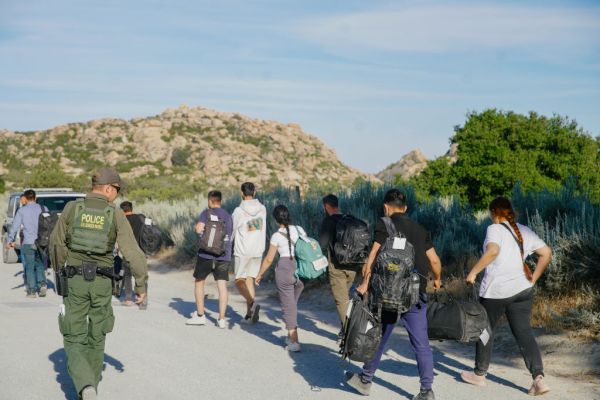The 2020 presidential election effectively ended in the early morning hours of January 7, when the House of Representatives reconvened to certify the results after the Capitol had been cleared of rioters. Joe Biden was sworn in as president on January 20 and marked his 100th day in office last week. And yet Republicans are still contesting the results in one Arizona county.
In late February, the GOP-controlled Arizona State Senate issued subpoenas to get access to and review 2.1 million Maricopa County ballots and 400 voting machines. The Republican-controlled Maricopa County Board of Supervisors pushed back against this demand, saying it was a breach of Arizona voters’ privacy rights, and voted 4-1 to file a court complaint to seek clarification on whether or not they had to follow the subpoena from the Senate.
The audit officially started on April 23, after a judge ruled that the Senate had a right to the ballots and machines, and the county board said it would cooperate with the audit. There is no deadline for when it will wrap, according to Ken Bennett, the Senate liaison to the audit and former Arizona secretary of state.
“You have a few members of the Republican Senate Caucus who truly and really believe, without any shred of evidence, that there was wrongdoing in our election, that there was fraud, and that there were mistakes. The rest of the Senate caucus, which I think is most of them, do not have the courage of their convictions to just stand up and say, ‘Enough is enough. We’re not doing this,’” Republican election lawyer Chris DeRose, who recently wrote an op-ed for the Washington Post denouncing the audit, told The Dispatch. He added, “It would be funny if the stakes weren’t so high.”
It’s not even the first audit done in Maricopa County. On January 27, 2021, the county’s Board of Supervisors voted unanimously to conduct a forensic audit of the 2020 election results. The county hired two independent auditors, Pro V&V and SLI Compliance, to review the Dominion Voting Systems machines used in Arizona to determine whether any part of the systems were vulnerable to hacks, if any suspicious malware was installed on the systems, to test that tabulators were not receiving information over the internet, and to confirm that no “vote switching” occurred.
The results? According to the Maricopa County Elections Department, the county’s election equipment and software passed all of the tests the auditors put them through. Further, the county said the Arizona secretary of state’s office conducted its own battery of tests before and after the election. Plus, both political parties conducted a hand recount of the ballots following the November election.
Experts have criticized various aspects of the audit, from the company who was hired to lead the audit, to several procedural problems, and sounded a warning that it could undermine public trust in the electoral process.
Senate Republicans have hired a Florida-based digital security firm, Cyber Ninjas, to help conduct the audit. However, Cyber Ninjas does not specialize in election security or vote counting. The company’s website says its job is to “equip and provide others with the data and skills necessary to build secure software.” As for actual services provided by the company, the website says it offers training, general consulting on data security, and can check how vulnerable its clients may be to potential hacks.
Cyber Ninjas tried to conduct the audit basically in secret, but a judge ruled that it could not hide its policies and procedures from the public or the media.
Cyber Ninjas founder Doug Logan believes that the 2020 election was stolen from Donald Trump, and even authored a document that was intended to be given out to U.S. senators with “evidence” that the election was stolen that was posted on lawyer and conspiracy theorist Sydney Powell’s website, the Arizona Mirror reported. Plus, Logan utilized his now deleted Twitter account to spread “Stop the Steal” lies via original tweets and retweets, the Arizona Mirror also reported. Logan also was listed as an “expert witness” in an Antrim County lawsuit in Michigan that was riddled with unsubstantiated claims of election fraud, which Alec Dent of The Dispatch wrote about months ago. Cyber Ninjas did not respond to requests for comment from The Dispatch.
As for the cost of this operation, Arizona taxpayers are footing part of the bill for the audit, $150,000 worth, to be exact. That isn’t the entire cost, though. The Arizona Republic reported that narrower audits in other states cost upward of $2 million, and that private donations are being sought to cover the rest. A website called FundtheAudit.com was started by “The America Project,” a group that has the backing of former Overstock CEO and election conspiracy theorist Patrick Byrne.
Even with all of that controversy, the audit is in full swing at the Arizona Veterans Memorial Coliseum in Phoenix. The actual audit process has election experts sounding the alarm that the ballots are in danger of being lost, stolen, or tampered with.
Election experts from the Brennan Center for Justice, The Leadership Conference, and Protect Democracy sent a letter to Chris Herren at the Civil Rights Division for the U.S. Department of Justice saying federal agents need to be deployed to the Coliseum to oversee the operations there.
The experts wrote on April 29, “We are very concerned that the auditors are engaged in ongoing and imminent violations of federal voting and election laws. Specifically, we believe that the senate and its agents, including Cyber Ninjas, are 1) violating their duty under federal law to retain and preserve ballots cast in a federal election, which are and have been in danger of being stolen, defaced, or irretrievably damaged, and 2) preparing to engage in conduct which will constitute unlawful voter intimidation in violation of the Voting Rights Act and other federal laws.”
After Judge Martin ruled Cyber Ninjas could not keep its processes a secret, the company produced a few policies and procedure guides. The actual work seems to be split up between two contracting companies, Wake TSI and CyFRI, while Cyber Ninjas is listed as the “project lead.” Wake TSI is responsible for the ballot recount and inspection, while CyFRI is doing the machine audit.
The actual work being conducted in the Coliseum has been full of mistakes and unnecessary checks on the ballots. For example, Arizona election law stipulates that ballots are to be marked only with red pens, not blue or black because the machines that count the ballots can pick up blue or black markings, not red. Arizona Republic reporter Jen Fifield noticed that workers were using blue pens and pointed that out to Cyber Ninjas CEO Logan, who did not seem to know why that was a problem.
Another odd check in the audit process that was being conducted on the ballots was the use of a UV light to pick up on special yellow markings or watermarks. But Maricopa County does not use ballots with watermarks, the Arizona Republic reported, and the use of the UV lights is a potential nod to a QAnon conspiracy about fraudulent ballots.
“Many people predicted this was going to be a disaster before it started, and the process so far has just confirmed all those doomsday predictions,” Arizona political consultant Barrett Marson told The Dispatch. “One of the things that this group is doing is rather than instilling confidence in our vote, I think they’re breaking down confidence because of the shoddy way that they are doing things.”
Media access to observe the audit is extremely limited according to multiple reporters on the ground, although AZAudit.org is offering a livestream of the audit.
One reporter was even kicked out of the Coliseum after taking a picture of former Arizona state Rep. Anthony Kern. Ryan Randazzo of the Arizona Republic was told his press privileges were revoked after tweeting out the picture because a ballot could be seen, but was not exactly legible, in the photo.
Bennett said the reporter was removed because he ran afoul of an agreement between the audit team and the press that no pictures of ballots would be taken. However, the actual agreement was that pictures that showed information on the ballot were banned, not pictures of the ballots themselves. Randazzo was relegated to the Coliseum parking lot.
Why was it even a big deal that Kern was in the room counting ballots? Well, his name was on the ballot in 2020, and he lost. He ran as an incumbent to be the representative from District 20 (which is in Maricopa County) in the Arizona State House, a position he held since 2015. Kern was also present on the National Mall on January 6 when insurrectionists stormed the Capitol building.
Bennett said he did not know Kern was hired to help and he did not know his name was on the ballot in 2020 and that he lost his election, the Arizona Capitol Times reported.
How is this all going to end? DeRose fears the worst, “I think this is a process that began from the conclusion and is working backwards from the conclusion. They’re trying to find something that will undermine the credibility of the 2020 election in Maricopa County.”
DeRose told The Dispatch that watching this all play out without any type of safeguards in place forced him to speak out, and now he wishes more would do the same. “Where is everyone else? Where are the Republicans in the Senate caucus to just say, ‘This has become an expensive joke and it needs to come to an end.’ Everyone is so scared about their next election, and so it’s really disappointing.”








Please note that we at The Dispatch hold ourselves, our work, and our commenters to a higher standard than other places on the internet. We welcome comments that foster genuine debate or discussion—including comments critical of us or our work—but responses that include ad hominem attacks on fellow Dispatch members or are intended to stoke fear and anger may be moderated.
You are currently using a limited time guest pass and do not have access to commenting. Consider subscribing to join the conversation.
With your membership, you only have the ability to comment on The Morning Dispatch articles. Consider upgrading to join the conversation everywhere.